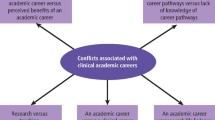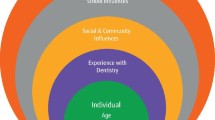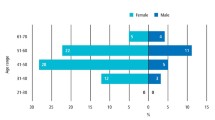Abstract
Aims To investigate the gender differences among University of Birmingham dental students and dental core trainees (junior trainees within four years of graduation) in the West Midlands, and to assess career aspirations and working patterns.
Methods A questionnaire was distributed to 189 dental students in years 2, 3 and 4 and to 24 dental core trainees. Data were collected in July 2017 by means of a paper questionnaire. A pilot of 40 questionnaires was carried out to ensure the validity of the questionnaire. All data were processed with Microsoft Excel.
Results Seventy percent of individuals indicated work-life balance was their reason for choosing dentistry, made up of 25% males and 45% females. A larger percentage of female dentists opted to work in dental practice-based settings. Twenty-three percent of undergraduates want to specialise in the future, two-thirds of which were female. In comparison, 83% of the dental core trainees in our cohort want to specialise - 60% of males and 100% of females. The remaining 40% of male dental core trainees answered 'unsure' rather than 'no'. Restorative dentistry, orthodontics and oral surgery were the most popular choice of specialist training. Oral surgery was chosen by nearly twice as many females as males. Paediatric dentistry was selected mostly by females.
Conclusion Women are making up a greater percentage of dental students at the University of Birmingham; their career aspirations and working patterns could have future implications for workforce planning.
This is a preview of subscription content, access via your institution
Access options
Subscribe to this journal
Receive 24 print issues and online access
$259.00 per year
only $10.79 per issue
Buy this article
- Purchase on Springer Link
- Instant access to full article PDF
Prices may be subject to local taxes which are calculated during checkout




Similar content being viewed by others
References:
Pacey L. Investigation: Have women changed the dental workforce? Br Dent J 2014; 216: 4-5.
General Dental Council. Registration Report - March 2020. 2020. Available at https://www.gdc-uk.org/docs/default-source/registration-reports/registration-report---march-2020.pdf (accessed March 2020).
Solomon E. The Future of Dentistry. 2005. Available at http://www.dentaleconomics.com/articles/print/volume-95/issue-2/features/the-future-of-dentistry.html (accessed November 2018).
Puryer J, Patel A. The career intentions, work-life balance and retirement plans of dental undergraduates at the University of Bristol. Br Dent J 2016; 220: 183-186.
Stewart F M, Drummond J R, Carson L, Reddick G H. The future of the profession - a survey of dental school applicants. Br Dent J 2004; 197: 569-573.
Stewart F M, Drummond J R, Carson L, Reddick G H. A survey of dental school applicants' career intentions and the balance with family life. Br Dent J 2005; 198: 713-717.
Stewart F M, Drummond J R, Carson L, Theaker E D. Senior dental students' career intentions, work-life balance and retirement plans. Br Dent J 2007; 203: 257-263.
Waylen A, Barnes O, Kenyon P, Neville P. Can motivations for studying dentistry inform us about gender and BME differences in dental academic careers? Br Dent J 2017; 222: 13-15.
Russell E, Leggate M. Dentists in general and community practice: a Scottish survey. Br Dent J 2002; 193: 333-337.
Seward M. The gender challenge. Br Dent J 2000; 189: 525.
Lachish S, Svirko E, Goldacre M J, Lambert T. Factors associated with less-than-full-time working in medical practice: results of surveys of five cohorts of UK doctors, 10 years after graduation. Hum Resour Health 2016; 14: 62.
Stewart F, Drummond J. Women and the world of dentistry. Br Dent J 2000; 188: 7-8.
Castro S M, Armitage-Chan E. Career aspiration in UK veterinary students: the influences of gender, self-esteem and year of study. Vet Rec 2016; 179: 408.
Scarbecz M, Ross J A. The relationship between gender and postgraduate aspirations among first- and fourth-year students at public dental schools: a longitudinal analysis. J Dent Educ 2007; 71: 797-809.
Author information
Authors and Affiliations
Corresponding author
Rights and permissions
About this article
Cite this article
Khan, S., Ibrahim, S., Butt, R. et al. The influence of gender on career aspirations of University of Birmingham dental students and junior trainees in the West Midlands. Br Dent J 228, 933–937 (2020). https://doi.org/10.1038/s41415-020-1704-6
Published:
Issue Date:
DOI: https://doi.org/10.1038/s41415-020-1704-6
This article is cited by
-
Dental hygiene and dental students’ motivations for future work: a cross-sectional study of first-year students at a dental hygiene school and a dental school in Japan
BMC Medical Education (2023)
-
Female career progression
British Dental Journal (2020)



